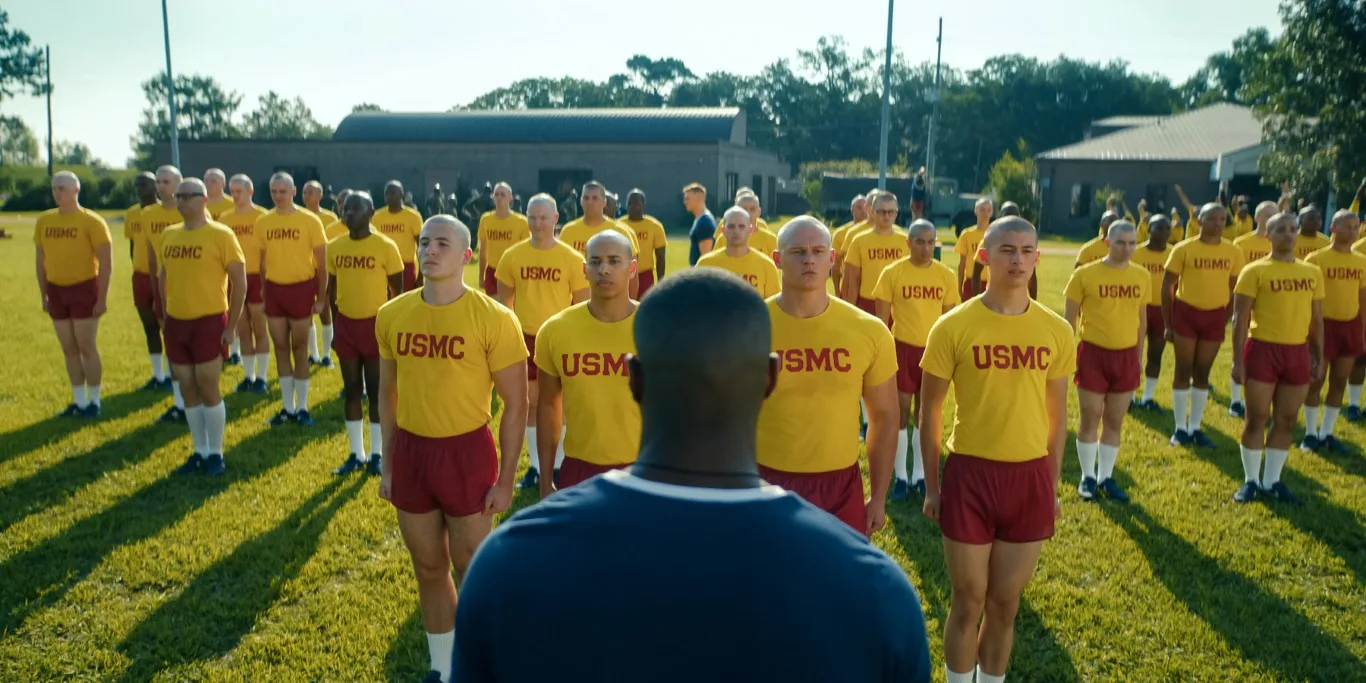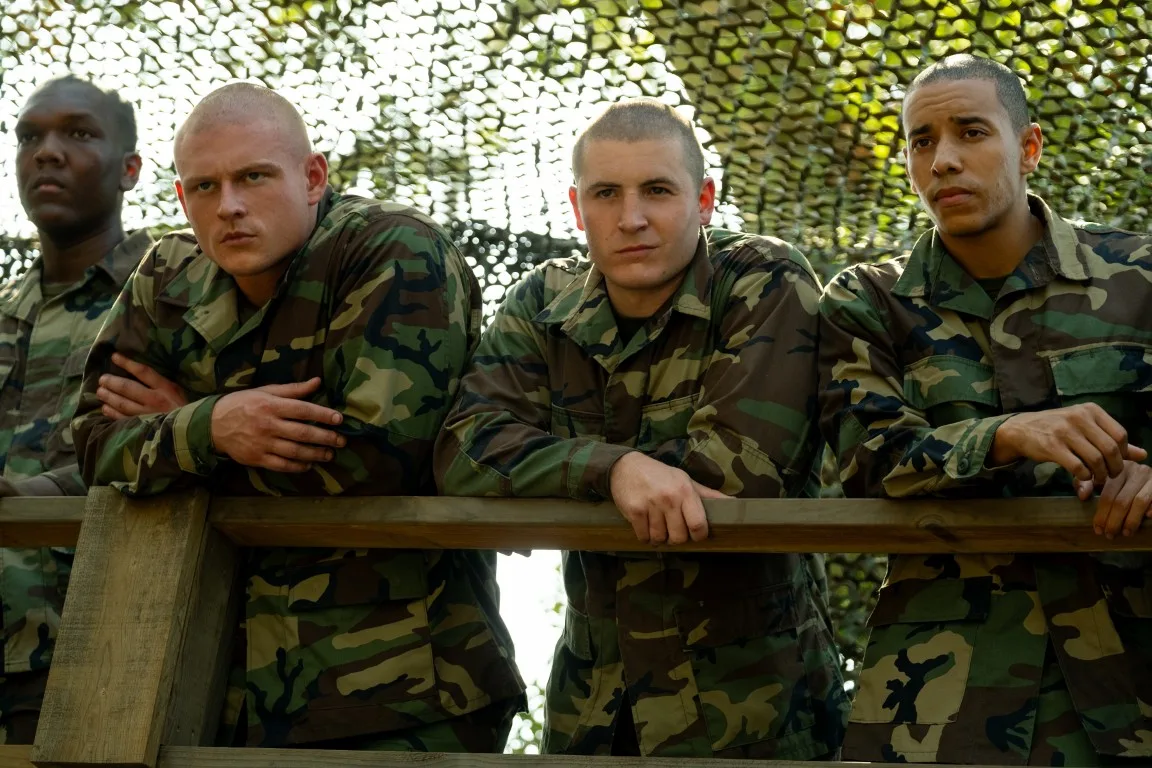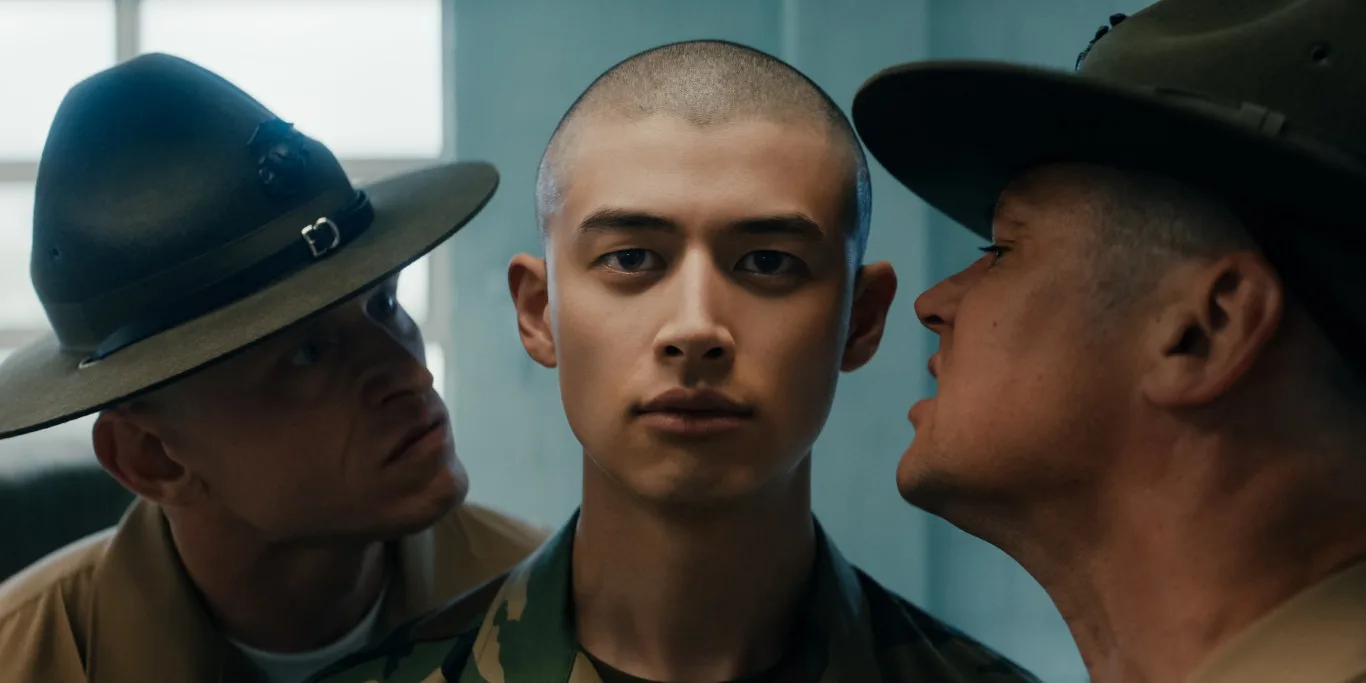Basic training in the United States Marine Corps is a lonely business. So lonely, in fact, that 18-year-old Cameron Cope (Miles Heizer, “13 Reasons Why”), the central protagonist of Netflix’s new series “Boots,” frequently has conversations with his hidden queer self. Though dressed alike, Cope’s concealed persona is blunt, witty, and encouraging, while the Cameron the outside world sees is scared, a little slow to react, and genuinely thought the Marine Corps would be like summer camp. “When we said we needed a change,” inner-Cam tells outer-Cam wryly, as they sit on their bunk bed, trying to catch their breath from intense exercises, verbal assaults, and constant threats of physical violence, “I meant San Francisco, or New York. But this is nice too!” It’s a little different when you realize your job is to learn how to follow orders and kill people.
Inspired by The Pink Marine, Greg Cope White’s memoir of enlisting and serving as a Marine hiding his sexuality, the series makes edits to White’s story in order to tell Cameron’s. White enlisted in the 1980s; Cameron joins, along with his best friend Ray (Liam Oh), in the year 1990, hoping to take advantage of the Marines’ so-called “buddy system.”
The story also delves into the backgrounds of all the other boys—for they are truly boys, with still-developing frontal lobes—joining the platoon, including twins John (Blake Burt) and Cody (Brandon Tyler Moore), whose determination to succeed in the Marine Corps is a goal borne from two traditions: horrific lifelong abuse and family enlistment since the 1860s. Eduardo (Jonathan Nieves) is a sweetheart greatly missing his sweetheart, Gloria, and is determined to succeed as the man she deserves. Hicks (Angus O’Brien) is Vincent D’Onofrio’s Private Leonard Lawrence of “Full Metal Jacket” reborn, only faster and more gleeful. Ray, too, is the son of a Marine Corps member whose idea of addressing his son’s severe anxiety disorder was to skip the doctor’s appointment in favor of having Ray trim the family’s lawn with a ruler and a pair of scissors.

Cameron also comes from a home environment that is the opposite of supportive and loving. His mother Barbara (Vera Farmiga, unsurprisingly impeccable) is so removed from being a present mother that when Cameron informs her that he’s headed to USMC basic training, she simply says, “Stop for milk. Nonfat. Or 1% if they have it.” One of the things “Boots” does best is highlight how all of the recruits’ parents have created ripe conditions for their children to seek an environment where every part of their personality is stripped and destroyed, to build a person who will not question orders, who will fall in line, who will prize testosterone-charged togetherness as the pinnacle of human emotion. Because any belonging—even belonging that comes as a result of fatphobic/homophobic/racist slurs, physical/verbal abuse, or dismissal of mental illness—feels good over a persistent, aching rootlessness.
It’s not that “Boots” doesn’t boast compelling performances. Farmiga, as noted earlier, is flawless. It’s really no surprise she played a young Livia Soprano with such ease in “The Many Saints of Newark”; her scenes as Barbara are such a captivating blend of light and dark that I’d happily watch a spin-off limited series about how Barbara became the remote, yet still somewhat self-aware and finally guilt-ridden, mother she is today. Heizer finds some lovely beats as someone who has accepted his sexual orientation but is stuck in an environment where self-discovery takes place at the expense of concealment. (In a way, “Boots” is an intriguing companion piece to “Overcompensating,” a more modern tale about the consequences of hiding a basic fact about yourself.) Max Parker turns in an astounding, layered performance as the Type A drill instructor Sergeant Robert Sullivan; it was a shock to realize Parker is English, for there isn’t even a hint of an accent in his terrifying dialogue delivery.
Unfortunately, the flaws in “Boots” arise from two very different creative decisions. First, although the series is based on White’s memoir of being a closeted Marine, Cameron Cope is not the central focus of the story. There are mentions of the inherent campiness of Marine Corps life: the nudity, peers masturbating in the showers at night, grown men growling at you to “Mount!” And “Boots” could have used far more of that inherent humor. Instead, various other characters are used to explore, in White’s words, “who gets to be counted as an American, who gets to be included in the story.”

But that is an incredibly rosy view of the story White and his colleagues have presented. The American armed forces don’t recruit amongst the wealthy and middle classes; as represented by the characters in the series, they specifically target young people whose home lives and economic prospects are desperate, which inherently makes this a skewed vision of “who gets to be counted as an American.”
Second, this was Norman Lear’s last project as an executive producer before his death in 2024; he also mentored White for many years. As a result, there is an overriding chipper tone to the writing thanks to Lear’s momentous sitcom background, which doesn’t fit the subject. Showrunner Andy Parker, who actually brought military recruiters to his home when he was a teenager to convince his parents to let him enlist, said he “never wanted [the series] to be a propaganda piece for the military,” but also didn’t want it to be an “assault against it.” In trying to play both sides, “Boots” falls flat tonally.
The message, it seems, is that all of the drill instructors are essentially good people, they just follow orders to be verbally cruel because that’s how you get good soldiers, and no one in command is actually homophobic. Precious little time is spent on how easy it is to manipulate those whose lives have been spent in repression. This leads to an oversimplification of what military life was and is actually like for queer service members, despite the creators’ best intentions.
All eight episodes screened for review.












